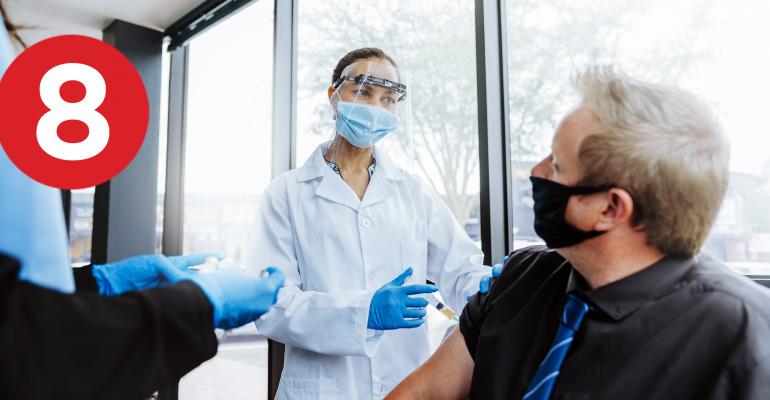- Corporate America Rethinks Vaccine Mandates “To date, most companies haven’t required returning workers to get inoculated. Will that change? ‘We all but shamed people,’ Johnny Taylor, the C.E.O. of the Society for Human Resource Management, said of companies cajoling and offering incentives for workers to get vaccinated. ‘But now we’re at a point that none of that’s working and we’ve got to close the gap.’ North Carolina-based Novant Health said last week that it would make inoculations mandatory after trying other ways to overcome vaccine hesitancy.” (The New York Times)
- Fed Weighs Curbing Cash Machine as Critics Warn of Housing, Stock Bubble “Shortly after the pandemic struck last year, the Federal Reserve began buying billions of dollars in government debt every month to drive down borrowing costs and keep the economy from collapsing. Today, house prices are surging, stocks have continued their stratospheric rise, and banks have more cash than they know what to do with. Yet the Fed is still pumping billions into the economy. Why? That’s what a growing number of lawmakers, investors and even some Fed officials themselves are demanding to know.” (Politico)
- Real Estate Investor Rick Caruso Reopening Challenges amid COVID “Rick Caruso, founder and CEO of Caruso, joins ‘Squawk on the Street’ to give his take on the challenges facing retail and hospitality as Covid case rise again.” (CNBC)
- San Diego Audit Faults Real Estate Deals Under Faulconer “When Kevin Faulconer was San Diego’s mayor, his administration failed to follow best practices and conduct due diligence when spending hundreds of millions of dollars on real estate purchases, a city audit found. The audit released Thursday, reported by the San Diego Union-Tribune, explores four real estate deals totaling $230 million the city entered into under Faulconer’s leadership. The auditors wrote “a serious lack of policies and oversight caused the City to miss or skip key steps in the acquisition process” and that Faulconer’s administration left out or misrepresented key information.” (The Associated Press)
- Return to Office Hits a Snag: Young Resisters “Some industries, like banking and finance, are taking a harder line and insisting workers young and old return. The chief executives of Wall Street giants like Morgan Stanley, Goldman Sachs and JPMorgan Chase have signaled they expect employees to go back to their cubicles and offices in the months ahead. Other companies, most notably those in technology and media, are being more flexible. As much as Mr. Gross wants people back at his ad agency, he is worried about retaining young talent at a time when churn is increasing, so he has been making clear there is room for accommodation.” (The New York Times)
- Manhattan Warehouse Overhaul Lands $1.3B Loan “L&L Holding Co. and Columbia Property Trust have closed on $1.25 billion in financing for the adaptive redevelopment of the 1.2 million-square-foot historic Terminal Warehouse in Manhattan’s West Chelsea neighborhood. The deal marks New York City’s largest construction financing package so far this year. Blackstone Real Estate Debt Strategies was behind the $974 million senior note, along with Goldman Sachs and KKR, while Oaktree Capital Management, in a venture with Paramount Group, provided the $274 million junior mezzanine debt. CBRE arranged the deal for the developers.” (Commercial Property Executive)
- Manhattan Lags Chicago, LA in Returning to Offices “For all of Wall Street’s drum-beating to march workers back to their desks, Manhattan office buildings have actually been slower to refill than those in Los Angeles and Chicago. The nation’s three largest office markets were emptied early last year by the coronavirus, but data show attendance varied wildly among those cities and their industries — and still does.” (The Real Deal)
- Manhattan’s Fast-Casual Restaurants Aren’t Waiting for Office Return “You don’t win friends with salad. Sure. But, the pandemic has taught a lesson or two to salad makers and other fast-casual restaurants in Manhattan’s business districts, forcing them to adapt to the office worker exodus by seeking out new customers and exploring new geographies. When COVID-19 hit New York City in March 2020, Manhattan’s business centers essentially shut down. People stopped going to the office, and, by and large, they have stayed away. As of the end of May of this year, just 12 percent of Manhattan office workers had returned to their desks, according to a Partnership for New York City survey.” (Commercial Observer)
0 comments
Hide comments





